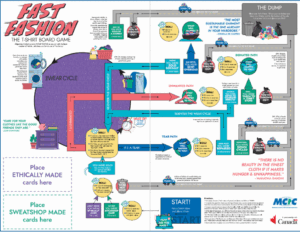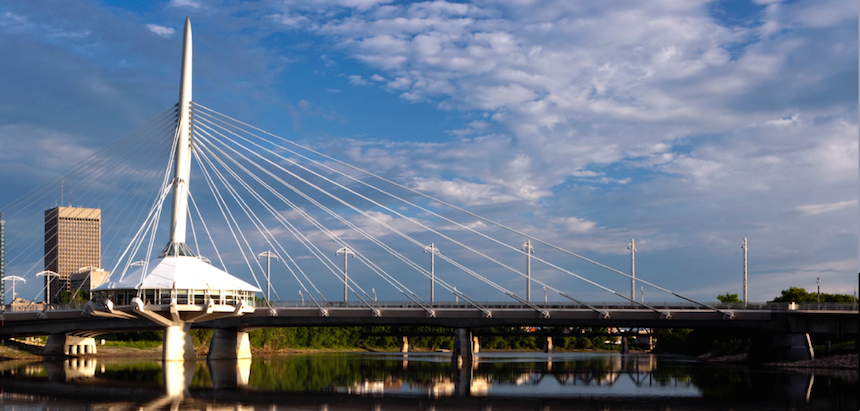On this page, you will find resources that you can use to help connect students to climate change in your classroom:
- How to Teach Climate Change
- Book a Classroom Presentation
- Activity sheets
- Manitoba Earth Week Activities
- Handouts
- Lesson plans
- Learning guides
- Community connections
- Videos
- Order an Idle Free Zone Sign
Click a link in the list above to jump to that topic on this page.
How to Teach About Climate Change
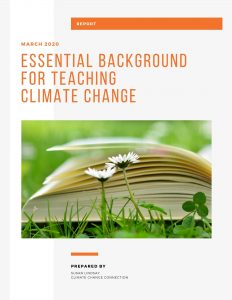 Essential background guide for teaching climate change
Essential background guide for teaching climate change
This document provides some best practices to inspire teachers to engage students in more climate change conversations, projects, and ultimately, action. March 2020.
 Manitoba Emissions, Impacts, and Solutions: A Climate Change Resource for Grade 5 – 12 Teachers
Manitoba Emissions, Impacts, and Solutions: A Climate Change Resource for Grade 5 – 12 Teachers
Sorry link was lost and PDF to come. Please contact us. A great resource for Manitoba teachers to engage their students in the topic of climate change.
Activity Sheets
These are Manitoba specific hands-on activities that can guide student learning:
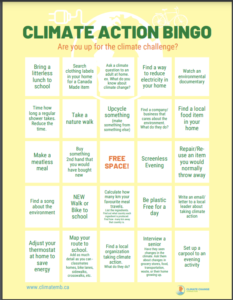
Climate Action Bingo: Are you up for a challenge? Enjoy this family and classroom friendly activity that will get you thinking about climate action!
- Worksheet: Climate Action Bingo (116 KB PDF)
- Worksheet: French version /en Français Bingo Action Climat (116 KB PDF)
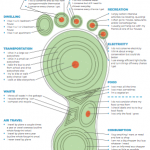 Carbon Footprint: A great activity for students to understand where emissions come from in their daily lives.
Carbon Footprint: A great activity for students to understand where emissions come from in their daily lives.
- Worksheet: Carbon Footprint (1 MB PDF)
- Worksheet French version /en Français – Empreinte Carbone (483 KB PDF)
- Background sheet for teachers: Carbon Footprint Backgrounder (125 KB PDF)
- Learning Outcomes: Carbon Footprint Learning Outcomes (128 KB PDF)
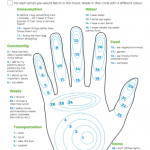 Ecological Handprint: A positive spin on the Carbon Footprint, this “hands-on” activity asks students to self-assess all the good things they are doing for the environment, plus identify other ways they can help!
Ecological Handprint: A positive spin on the Carbon Footprint, this “hands-on” activity asks students to self-assess all the good things they are doing for the environment, plus identify other ways they can help!
- Worksheet: Ecological Handprint (70 kB PDF)
- Worksheet French version /en Français –Empreinte Écologique (499 kB PDF)
- Background sheet for teachers: Ecological Handprint Backgrounder (162 kB PDF)
- Learning Outcomes: Ecological Handprint Learning Outcomes (115 kB PDF)
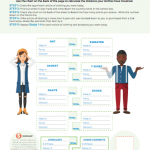 You Are What You Wear: This interactive activity finds students checking their clothing tags as a means of understanding the impact of their fashion.
You Are What You Wear: This interactive activity finds students checking their clothing tags as a means of understanding the impact of their fashion.
- Worksheet: You Are What You Wear (462 kB PDF)
- Background sheet for teachers: You Are What You Wear Backgrounder (107 kB PDF)
- Learning Outcomes: You Are What You Wear Learning Outcomes (116 kB PDF)
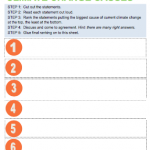 Ranking Climate Change Causes: Are transportation emissions worse than agriculture emissions? What about factory pollution? This activity challenges students to think critically about climate change causes on a local, national, or global scale.
Ranking Climate Change Causes: Are transportation emissions worse than agriculture emissions? What about factory pollution? This activity challenges students to think critically about climate change causes on a local, national, or global scale.
- Worksheet: Ranking Climate Change Causes (423 kB PDF)
- Background sheet for teachers: Ranking CC Causes Backgrounder + Answer Key (194 kB PDF)
- Learning Outcomes: Ranking CC Causes Learning Outcomes (111 kB PDF)
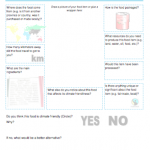 Food Print: In this hands-on activity, students have the opportunity to think critically about how food choices impact climate chang
Food Print: In this hands-on activity, students have the opportunity to think critically about how food choices impact climate chang
- Worksheet: Food Print (378 kB PDF)
- Background sheet for teachers: Food Print Backgrounder (103 kB PDF)
- Learning Outcomes: Food Print Learning Outcomes (126 kB PDF)
 Local Food = Cleaner Air: A great activity to get students thinking about cleaning our air, while learning Math, Science, Social Studies, ELA, and Art.
Local Food = Cleaner Air: A great activity to get students thinking about cleaning our air, while learning Math, Science, Social Studies, ELA, and Art.
- Worksheet: Local Food = Cleaner Air (137 KB PDF)
Manitoba Earth Week Activities
Enjoy these family friendly activities that will get you thinking about nature:
 MB Earth Week Bingo: A great activity for help families celebrate Earth Week.
MB Earth Week Bingo: A great activity for help families celebrate Earth Week.
- Worksheet: Manitoba Earth Week Bingo (115 KB PDF)
- Worksheet French version /en Français – Bingo Action Climat (115 KB PDF)
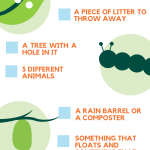 MB Earth Week Scavenger Hunt: A great activity to help families get outdoors during Earth Week.
MB Earth Week Scavenger Hunt: A great activity to help families get outdoors during Earth Week.
- Worksheet: Manitoba Earth Week Scavenger Hunt (137 KB PDF)
 MB Earth Week Colouring Sheets: These Manitoba wildlife are struggling to keep up with our rapidly changing climate.
MB Earth Week Colouring Sheets: These Manitoba wildlife are struggling to keep up with our rapidly changing climate.
- Colouring page #1: Caribou, Monarch, and Great Grey Owl colouring page
- Colouring page #2: Arctic Hare and Arctic Fox
- Colouring page #3: Polar bear, Beluga, and Ring Seal
Prairie Climate Centre – The Climate Atlas – Teacher Resources:
 Climate Atlas of Canada – Guidebook for Educators: The Climate Atlas is a tool that combines science, mapping, and storytelling together to help people better understand and visualize climate change.This guidebook was created to help educators navigate the Climate Atlas of Canada in the context of classroom education.
Climate Atlas of Canada – Guidebook for Educators: The Climate Atlas is a tool that combines science, mapping, and storytelling together to help people better understand and visualize climate change.This guidebook was created to help educators navigate the Climate Atlas of Canada in the context of classroom education.
- Climate Atlas Student Handbook – This is a pre-made slide deck created for educators to introduce the Climate Atlas of Canada to their students.
- Introduction to Lesson Plans – These lesson plans aim to help educators bring climate change into their classroom using the Climate Atlas of Canada.
- Lesson Plan 1: Carbon and Climate Change – Students will examine the impact of a high carbon scenario across Canada and at a local scale.
- Lesson Plan 2: Climate Change and Health – Students will learn the impacts that climate change has on human health.
MCIC – Fast Fashion – The T-Shirt Board Game:
Most consumers don’t know where their clothes come from, how they are made, or who makes them. This interactive board game helps students understand all the steps and energy needed during the life of a t-shirt. You can download the board game, instructions, and backgrounder here.
Check out other classroom activities, like Building a good life, Forced to flee, Designing for the future, Banana webs, and climate justice.
Recommended activities (may not be Manitoba-specific and they are not created by us):
- Greenhouse gas game
- Walking in someone else’s shoes, page 14,15
- Impacts of climate change around our world, page 13
- Climate Change Discussion Cards, page 5
- Making the Change Teaching Ideas, page 3
- Sphere of influence, page 16
- Ava’s Flowers – Environmental Education and Virtual Field Trips for Nature Lovers
Handouts
These are one-sheet hand-out documents we have made available during previous Youth Conferences on Climate Change:
- Brainstorming (506 kB PDF)
- Communication (646 kB PDF)
- Facilitation (488 kB PDF)
- Leadership (853 kB PDF)
- Project Management (525 kB PDF)
- Project Management – Worksheet (38 kB Word)
- Social Marketing (519 kB PDF)
- Fundraising (758 kB PDF)
- To Make a Difference, You Need a Plan (30 kB PDF)
- Meet the Skeptic (283 kB PDF)
Lesson plans
These are lesson plans that we recommend for study in the classroom:
- Learning for Sustainable Futures – Lesson Plans at climatelearning.ca
- National Geographic Society – Multi-part lesson plans that can be adapted to suit your classroom. Most lessons include multimedia, group work, research, and discussion ideas.
- WWF – Provides a “Teacher Activity Guide”. This guide gives a good background on climate change and the importance of climate education. Activity 1: Climate Change Discussion Cards provides an easy and interactive way to start the climate change conversation in your classroom through pictures, facts, and discussion topics.
- Chasing Ice Lesson Plan – This “Docs for Schools” educational resource is made available by Hotdocs.ca to accompany the film Chasing Ice.
- Getting The Picture: Our Changing Climate is an innovative FREE online multimedia tool for climate science education. Acclaimed photographer James Balog and his team bring you the latest in climate science education, featuring unique archives of media, film, photography and first-hand accounts of our changing climate.
- Heat up over climate change – A resource from UNICEF exploring climate change and its effects on the world’s children.
- Climate Change Live – The U.S. Forest Service and 26 federal and NGO partners bring climate learning to you through a series of webcasts, webinars, and online climate education resources.
- MY NASA DATA – The lessons featured on this page provide a few possible ideas for climate change related studies using data from NASA.
- Thermal Expansion Model – An important part of understanding sea-level rise is understanding thermal expansion of water. Students will build a model using everyday items to demonstrate that water expands when heat energy is added.
Learning guides
These are resource guides that will help you shape your courses for learning outcomes related to sustainability:
- Learning for Sustainable Futures – Resources for Rethinking (R4R) is a FREE online database where educators can search for high-quality, teacher-reviewed, curriculum-matched resources (including lesson plans, videos, children’s books, outdoor activities and apps/games) on issues related to sustainability.
- MCIC – Sustainable Foundations: A Guide for Teaching the Sustainable Development Goals. This guide will provide you with information, educational resources and other supports to help you in your efforts to educate and engage young people so that they support sustainable development and are inspired to turn that support into action.
- Climate Change: Youth Guide to Action booklet (3.6 MB PDF) from Taking It Global
- Guide for Sustainable Schools in Manitoba – The vision of this Guide is for all schools in Manitoba and their communities to be sustainable. The Guide invites schools to take a whole-school approach to sustainability by exploring sustainability through curriculum, in addition to through real-life learning experiences, improvements in school management of resources and facilities (e.g., energy, waste, water, biodiversity, schoolyard design, and purchasing of products and materials), and associated social and financial issues.
- Learning for Sustainable Futures –
- Education for Sustainable Development (ESD) Correlation Charts of Student Learning Outcomes – These charts show student learning outcomes as they related to Manitoba sustainable development priorities in a minimum of two factor areas. Available for download as PDFs.
- UNESCO Climate Change Education for Sustainable Development (1.3MB) – This booklet outlines the 3 objectives of the UNESCO Climate Change Education for Sustainable Development programme:
- Strengthen the capacity of Member States to provide quality climate change education for sustainable development
- Improved education policy, analysis, research and planning
- Encourage and enhance innovative teaching approaches to integrate climate change education for sustainable development in school curricula
Community Connections
There are many great organizations working on climate change in Manitoba. Many of which are willing to help schools and teachers learn more about the issues and assist in action projects. Here are some we would like to highlight:
- Prairie Climate Centre – PCC is committed to making climate change meaningful and relevant to Canadians from all walks of life. Check out their Climate Atlas of Canada. It is an interactive tool to learn and climate change from coast to coast, to coast.
- Green Action Centre – GA Centre promotes greener living through environmental education and encourages practical green solutions for schools. Some of the programs they run are Active and Safe Routes to School, Clean Air Day, First Nations Waste Minimization Program, Waste Audits, and Compost Winnipeg.
- FortWhyte Alive – FWA provides a wonderful facility for getting students out exploring nature. Some of their programs include: From Farm to Fork, Due North: The Changing Arctic, Due North – The Changing Arctic, Our Changing Climate, and Weathering the Climate.
- Assiniboine Park and Zoo – Assiniboine Park offers many curriculum-linked, interdisciplinary programs for students in Pre-K through Grade 12. Their programs encourage a student’s inherent curiosity for the natural world and bring lessons to life. Some of these programs include Arctic Ecology, Polar Bears, and the Role of Zoos in a Changing Climate.
- Manitoba Eco-Network – MbEN is a non-profit that promotes positive environmental action in Manitoba. New Resource – Navigating the Law to Protect the Environment webinar series aims to provide information to activists, lawyers, students, and community members about a variety of environmental law topics.
- Wilderness Committee – WC has been on the ground in Manitoba, pushing for the protection of wild spaces, wild species, and healthy communities.
- Manitoba Council for International Cooperation – MCIC engages and collaborates with Manitobans for global sustainability. They are experts in teaching Sustainable Development Goals (check out their lessons for each SDG) and Fair Trade.
- Winnipeg Trails Association – WTA is a non-profit organization with the goal of developing a sustainable city, with a primary focus on active transportation in the Winnipeg community. They also organize the School Loops program.
- Canadian Parks and Wilderness Society – Manitoba Chapter – CPAWS is a champion of wilderness and parks in the province. They are experts in communicating issues affecting our parks and wilderness areas. Check out their Outdoor Education Program Lesson Plans.
For more community connections check out our Connection Network page.
Videos
Below are videos that we recommend for study in the classroom:
- Manitoba Emissions, Manitoba Solutions – This 15-minute video presents an overview of Manitoba’s greenhouse gas emission profile; where our GHG emissions come from, and what the recent trends have been. It also suggests some ideas for solutions within the Manitoba context. It was produced in 2016 and features Climate Change Connection’s own Curt Hull. If you like this presentation, we can come to you. You can request a presentation for your school, business, or organization.
- The Implications of Climate Change in Manitoba – This 14½-minute video features Dr Danny Blair from the University of Winnipeg. Danny provides an overview of the changes that have occurred in Manitoba’s climate in the last few decades. He also uses the computer projections compiled by the Prairie Climate Centre in their Climate Atlas project to give us insight into what we might expect in the future.
- Climate Atlas of Canada – The Climate Atlas of Canada has a variety of Canadian videos showing innovative solutions, impacts to local communities, and resiliency.
- The Story of Stuff – We know all about the problems — from climate change to income inequality to political corruption. The Story of Stuff movies focus instead on the big, exciting innovations driving the environmental and social change we need, as well as the little things individuals and communities can do to make a difference. The videos also include backgrounders and lesson plans. The Story of Stuff also has a great changemaker quiz your students will love.
- Chasing Ice – Chasing Ice received the 2014 News and Documentary Emmy® award for Outstanding Nature Programming. The film made its TV debut on the National Geographic Channel on April 19, 2013. Since that day, Chasing Ice has screened in more than 172 countries and on all 7 continents. (See lesson plan above.)
- Years of Living Dangerously – Years of Living Dangerously is a 9-part Showtime documentary television series focusing on climate change that premiered on April 13, 2014. James Cameron, Jerry Weintraub, Arnold Schwarzenegger, and clean energy investor and environmental activist Daniel Abbasi are executive producers of the series. The weekly episodes feature celebrity investigators, who each have a history of environmental activism, and well-known journalists, each of whom have a background in environmental reportage. These “correspondents” travel to areas around the world and throughout the U.S. affected by global warming to interview experts and ordinary people affected by, and seeking solutions to, the impacts of climate change.
You can also check out our Youth Video Challenge videos, all Manitoba made, here.




